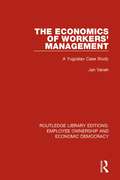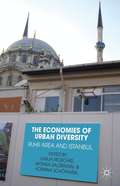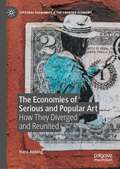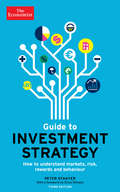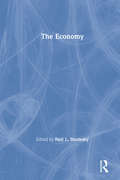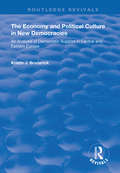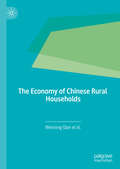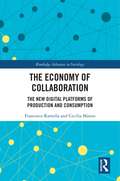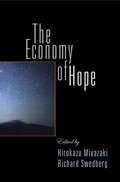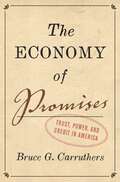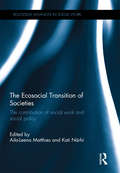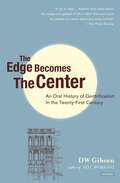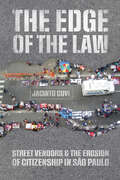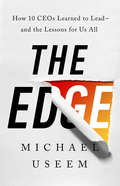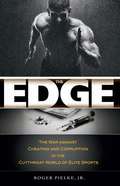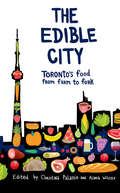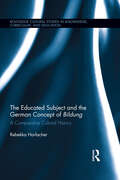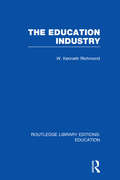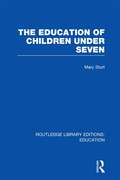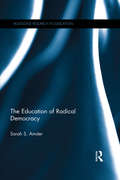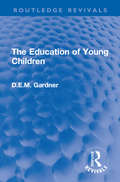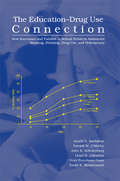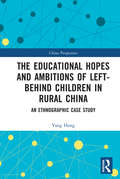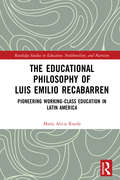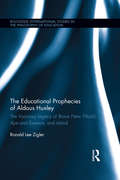- Table View
- List View
The Economics of Workers' Management: A Yugoslav Case Study (Routledge Library Editions: Employee Ownership and Economic Democracy #15)
by Jan VanekThe object of this study, originally published in 1972, consists in developing, against the background of Yugoslav theory and practice, a general theory of the behaviour of economic productive units (the enterprises), managed by those who work therein (the workers or producers) whose reward for work in their share in the group’s net income. This title will be of interest to students of employee ownership and economic democracy.
The Economies Of Urban Diversity
by Darja Reuschke Monika Salzbrunn Korinna SchönhärlThe Economics of Urban Diversity explores ethnic and religious minorities in urban economies. In this exciting work, the contributors develop an integrative approach to urban diversity and economy by employing concepts from different studies and linking historical and contemporary analyses of economic, societal, demographic, and cultural development. Contributors from a variety of disciplines geography, economics, history, sociology, anthropology, and planning make for a transdisciplinary analysis of past and present migration-related economic and social issues, which helps to better understand the situation of ethnic and religious minorities in metropolitan areas today.
The Economies of Serious and Popular Art: How They Diverged and Reunited (Cultural Economics & the Creative Economy)
by Hans AbbingCombining an economic perspective with sociological and historic insights, this book investigates the separation of ‘popular’ and ‘serious’ art over a period of almost two centuries. As the boundaries between our perceptions of established art and popular become more porous, Abbing considers questions such as: Who benefitted from the separation? Why is exclusivity in the established arts so important? Did exclusivity lead to high cost, high subsidies and high prices? Were and are underprivileged groups excluded from art consumption and production? How did popular music become so successful in the second half of the twentieth century? Why does the art profession remain extraordinarily attractive for youngsters in spite of low incomes? The book also discusses the evolution of art in the twenty-first century, considering for example how the platform economy affects the arts, whether or not the established arts are joining the entertainment industry, and the current level of diversity in art. Written from the dual perspective of the author as an artist and social scientist, the book will be of interest for cultural economists and academics as well as artists and general readers interested in art.
The Economist Guide to Investment Strategy: How to Understand Markets, Risk, Rewards, and Behaviour (Economist Books)
by The Economist Peter StanyerThe global financial crisis that erupted in 2008 exposed the flaws in many investment strategies. This book explores the controversies that surround the management of wealth, and provides guidance on how to construct investment strategies that are appropriate for each investor.With detailed analysis, supported by data and anecdotes, it is above all a practical guide. It shows how the insights of behavioral analysis are widely reflected in investor actions, while emphasizing the importance of basing investment strategy on the principles of traditional finance. And it takes into account new research into behavioral and traditional finance, which has created new understandings of what investors want to achieve, along with their customary mistakes.Additionally, this third fully updated and extensively revised edition includes a wide analysis of alternative investments such as art and wine.
The Economy
by Neil Larry ShumskyVolume 4 "THE ECONOMY’ of the American Cities; series. This collection brings together more than 200 scholarly articles pertaining to the history and development of urban life in the United States during the past two centuries. The selections in Volume 4 of the series concern the development of the urban economy since the early nineteenth century. Three groups of articles, each arranged chronologically, deal with three basic sectors of the economy—trade and commerce (especially retailing), manufacturing and industrialization, and finance. Individual articles address subjects as diverse as merchants and shopping malls, flour milling and scientific management, and the Chicago Board of Trade and redlining.
The Economy and Political Culture in New Democracies: An Analysis of Democratic Support in Central and Eastern Europe (Routledge Revivals)
by Kristin J. BroderickThis title was first published in 2000: This research examines the socio-economic and cultural factors that influence the development of democracy, and also explores how new democracies can be maintained and consolidated. It investigates the consolidation of new democracies in Central and Eastern Europe, which face the hurdle of transforming their economies. The study looks at the effect of economic factors on popular support for democracy and discusses what factors influence citizen commitment to democratic regimes in Central and Eastern Europe. It argues that citizen perception of well-being is an important element in influencing political support. Case studies cover developing democracies in Europe, such as the Czech Republic or Slovakia, and policy implications, specifically in terms of economic policy, are offered that may aid democracies in their consolidation.
The Economy of Chinese Rural Households
by Wenrong QianThis book provides a broad survey of Chinese rural households at a time of rapid change in China’s rural economy, examining the dual identity of households as consumers as well as producers of goods in terms of supply and demand. Based on the results of the China Rural Household Panel Survey (CRHPS) by Zhejiang University, this book analyzes four types of economic activities of rural households in China, particularly considering changes at the micro level. It examines how households strive to maximize family efficacy through input-output production decision-making in allocating limited resources. Examining data pertaining to agricultural production, land exploitation, migration and nationalization, as well as changes in economic behavior, this book offers a snapshot of the current situation of rural households in China and suggestions to improve living standards and related policies.
The Economy of Collaboration: The New Digital Platforms of Production and Consumption (Routledge Advances in Sociology)
by Francesco Ramella Cecilia ManzoOver the past few decades, the world economy has undergone radical transformations, in part connected to the expansion of the ‘digital economy’, in part to the growing interconnection via the internet of the world of objects and physical processes. This ‘great transformation’ poses the dilemma on the capitalism’s ability to reconcile economic and social value, keeping together economic well-being, social cohesion and political freedom. The Economy of Collaboration can offer a contribution in this direction but requires courageous policies to mediate the various interests at stake, as well as to rethink and make more sustainable its development, by increasing the benefits not only for businesses but also for workers and consumers. In short, to create shared value. This book refers to a mode of organizing the production, distribution and consumption of goods and services based on cooperative relations. The main reference is to activities linked to the digital economy, since they are the emerging forms of a definitely older phenomenon, but which is expanding on an ever-wider scale thanks to new technologies. These collaborative activities can be regulated differently, along a continuum that ranges from the pole of market exchanges to that of generalized reciprocity, with various intermediate mixed forms.
The Economy of Hope
by Richard Swedberg Hirokazu MiyazakiHope is an integral part of social life. Yet, hope has not been studied systematically in the social sciences. Editors Hirokazu Miyazaki and Richard Swedberg have collected essays that investigate hope in a broad range of socioeconomic situations and phenomena across time and space and from a variety of disciplinary vantage points. Contributors survey the resilience of hope, and the methodological implications of studying hope, in such experiences as farm collectivization in mid-twentieth-century communist Romania, changing employment relations under Japan's neoliberal reform during the first decade of the twenty-first century, the dynamics of innovation and replication in a West African niche economy, and Barack Obama's 2008 political campaign of hope in the midst of the unfolding global financial crisis. The Economy of Hope shifts the analytic of anthropological and sociological investigations from knowledge to hope, presents case studies on the loss of collective hope, and concludes by offering techniques for replicating hope. In the hands of Miyazaki and Swedberg and their distinguished contributors, hope becomes not only a method of knowledge but also an essential framework for the sociocultural analysis of economic phenomena. Contributors: Yuji Genda, Jane Guyer, Hirokazu Miyazaki, Annelise Riles, Richard Swedberg, Katherine Verdery.
The Economy of Promises: Trust, Power, and Credit in America
by Bruce G. CarruthersA comprehensive and illuminating account of the history of credit in America—and how it continues to divide the haves from the have-notsThe Economy of Promises is a far-reaching study of credit in nineteenth- and twentieth-century America. Synthesizing and surveying economic and social history, Bruce Carruthers examines how issues of trust stitch together the modern U.S. economy. In the case of credit, that trust involves a commitment by debtors to repay money they have borrowed from lenders. Each promise poses a fundamental question: why does the lender trust the borrower?The book tracks the dramatic shift from personal qualitative judgments to the impersonal quantitative measurements of credit scores and ratings, which make lending on a much greater scale possible. It discusses how lending is shaped by the shadow of failure, and the possibility that borrowers will break their promises and fail to repay their debts. It reveals how credit markets have been shaped by public policy, regulatory changes, and various political factors. And, crucially, it explains how credit interacts with economic inequality, contributing to vast and enduring racial and gender differences—which are only exacerbated by the widespread use of credit scores and ratings for “big data” and algorithmic decision-making.Bringing to life the complicated and abstract terrain of human interaction we call the economy, The Economy of Promises is an important study of the tangle of indebtedness that, for better or worse, shapes and defines American lives.
The Ecosocial Transition of Societies: The contribution of social work and social policy (Routledge Advances in Social Work)
by Aila-Leena Matthies Kati NärhiThis groundbreaking book both explains and expands the growing debate on ecological (environmental) social work at the global level. In order to achieve this, the book strengthens the environmental paradigm in social work and social policy by undertaking further research on theoretical and conceptual clarification as well as distinct reflections on its practical directions. Divided into five parts: concepts; the impact of environmental crises; sustainable communities and lifestyles; food politics; and the profession in transition, this work’s main objective is to place ecological social work as a part of the more comprehensive and interdisciplinary eco-social transition of societies towards sustainability, balancing economic and social development with the limited resources of the natural environment. By focussing on these five core concepts, it shows how social work and social policy contribute to this transition through having a research-based approach and orientation on solutions rather than problem analysis. The book will be of interest to scholars from a broad range of disciplines, including those in social work and social policy, sustainability, economics, agriculture and environmental studies.
The Edge Becomes the Center: An Oral History of Gentrification in the Twenty-First Century
by DW GibsonThis “generous, vigorous, and enlightening look at class and space in New York” examines the human side of gentrification—“a joy to read” (The Paris Review).For years, journalists, policymakers, critics, and historians have tried to explain just what happens when new money and new residents flow into established neighborhoods. But now, “Mr. Gibson lets the city speak for itself, and it speaks with charm, swagger and heartening resilience” (The New York Times).The Edge Becomes the Center captures, in their own words, the stories of people?brokers, buyers, sellers, renters, landlords, artists, contractors, politicians, and everyone in between?who are shaping and being shaped by the new New York City.In this extraordinary oral history, Gibson shows us what urban change looks and feels like by exposing us to the voices of the people living through it. Drawing on the plainspoken, casually authoritative tradition of Jane Jacobs and Studs Terkel, The Edge Becomes the Center is an inviting and essential portrait of the way we live now.
The Edge of the Law: Street Vendors and the Erosion of Citizenship in São Paulo
by Jacinto CuviHow street vendors tangle with the law in São Paulo, Brazil. The daily delights and conveniences that any city dweller has become accustomed to, such as cold water bottles on a summer afternoon in the park or a popsicle from a tray while you’re sitting in traffic, do not come cheap for those offering them. With a little initiative and very little startup money, an enterprising individual might sell you any of these things. Such vendors form a significant share of the workforce in São Paulo, Brazil. Some have the right to practice their trade; others do not. In The Edge of the Law, sociologist Jacinto Cuvi introduces us to this world of street vendors to tease out the relationship between constructions of legality and the experience of citizenship. As the government undertakes a large-scale plan to cancel street vending licenses and evict street vendors, Cuvi reveals how the rights of informal workers can be revoked or withheld, and how the lines can be redrawn between those whose work is “legal” and those who work running from the police. Alongside the mechanics of disenfranchisement, Cuvi captures the lived experience of criminalization, dissecting the distribution of (shallow) rights among these vendors as they continually reinvent strategies to etch out a living while dealing with the constraints and pressures of “informal citizenship” at the edge of the law.
The Edge: How Ten CEOs Learned to Lead--And the Lessons for Us All
by Michael Useem&“If you&’re not living on the edge, you&’re taking up too much space.&” —Jim Whittaker, first American to climb Mt. Everest A leader&’s job—in a radically changing world—is standing on the cliff edge, getting a grip on unfamiliar landscapes, and acquiring the skills for leading the enterprise into new territory. In a world facing the unprecedented challenges of global pandemic and economic distruption, every leader needs to find the edge for leaping across the breach and breaking new ground on the other side. Michael Useem provides rare insight into how ten leaders confronted hard realities. He looked close-in at the lide and work of people such as Bill McNabb of Vanguard, Jeffrey Lurie of the Philadelphia Eagles, Alex Gorsky of Johnson & Johnson, and Tricia Griffith of Progressive Insurance. His &“you are there&” profiles chronicle fateful decisions such as:Meeting the concerns of a next-generation workforce that considers inclusiveness an integral part of businessDeveloping a strategy for growth in a market that is crateringEscaping the confines of an insane, always-on, 24/7 world to learn about the real, granular changes happening in the marketplace Useem&’s profiles of leaders on the edge provide the inspiration and the guidance we all need for adapting and thriving in an era of massive disruption and continuous transformation.
The Edge: The War against Cheating and Corruption in the Cutthroat World of Elite Sports
by Simon Kuper Roger PielkeRoger Pielke reveals how sports stars break the rules in their search for a competitive edge.Both entertaining and thought-provoking, THE EDGE not only visits the battlefields in the war against cheating and corruption, but also explores ways to ensure that "the spirit of sport" can survive in today's high-tech, highly professional world.Drawing on controversies straight out of the headlines, Pielke looks at doping, match fixing, fake amateurism, and other ways of breaking the rules. But are those rules--and the values they reflect--hopelessly outdated?Wonderfully readable and scrupulously researched, THE EDGE blends science and journalism to produce an unforgettable account of sport in crisis.
The Edible City: Toronto's Food From Farm To Fork (uTOpia)
by Nicole Brossard Susanne De LotbiniIf a city is its people, and its people are what they eat, then shouldn't food play a larger role in our dialogue about how and where we live? The food of a metropolis is essential to its character. Native plants, proximity to farmland, the locations of supermarkets, immigration, the role chefs can and should play in society - how a city nourishes itself makes a statement about the kind of city it is.With a cornucopia of essays on comestibles, The Edible City considers how one city eats. It includes dishes on peaches and poverty, on processing plants and public gardens, on rats and bees and bad restaurant service, on schnitzel and school lunches. There are incisive studies of food-security policy, of feeding the needy and of waste, and a happy tale about a hardy fig tree.Together they form a saucy picture of how Toronto - and, by extension, every city - sustains itself, from growing basil on balconies to four-star restaurants. Dig into The Edible City and get the whole story, from field to fork.
The Educated Subject and the German Concept of Bildung: A Comparative Cultural History (Routledge Cultural Studies in Knowledge, Curriculum, and Education #2)
by Rebekka HorlacherGerman education plays a huge role in the development of education sciences and modern universities internationally. It is influenced by the educational concept of Bildung, which defines Germany ‘s theoretical and curricular ventures. This concept is famously untranslatable into other languages and is often misinterpreted as education, instruction, training, upbringing and other terms which don’t encompass its cultural ambitions. Despite this hurdle, Bildung is now being recognized in current discussions of education issues such as standardization, teaching to the test, evidence-based policy and high stakes testing. This volume clears up the confusion and misunderstandings surrounding Bildung by examining the origins of the concept and how it has been applied throughout history. It paves the way for educators to fully understand and benefit from this model and all it has to offer.
The Education Industry (Routledge Library Editions: Education)
by W Kenneth RichmondIn one sense, education was always a service industry. This book examines the quality as well as the quantity of contemporary education as it answers the following questions: Are we getting value for money? What makes a good teacher? What sort of education do we want? In the UK in the twentieth century education grew while national income did not. Britain devoted more of its resources to education than any other European nation and yet the UK had the largest proportion of children leaving school at 15 and spent more on each university place than the USA. The author argues that far too little attention was paid to cost-effectiveness analysis and planning. He examines Swedish and American examples and concludes that we must seek and employ the common features of modern management – network analysis, operational research and organizational theory. He also argues that traditional education has to come to terms with the mounting pressures of new curricula and new media.
The Education of Children Under Seven (Routledge Library Editions: Education)
by Mary SturtThis book does not cover the whole field of Infants’ Teaching but is concerned mainly with general principles and matters which are open to the non-specialist. Some technical subjects such as Physical Education have been omitted but nonetheless the volume provides a thorough (if somewhat dated) introduction to early years education in the first half of the twentieth century.
The Education of Radical Democracy (Routledge Research in Education)
by Sarah S. AmslerThe Education of Radical Democracy explores why radical democracy is so necessary, difficult, and possible and why it is important to understand it as an educative activity . The book draws on critical social theory and critical pedagogy to explain what enables and sustains work for radical democratization, and considers how we can begin such work in neoliberal societies today. Exploring examples of projects from the nineteenth century to the present day, the book sheds light on a wealth of critical tools, research studies, theoretical concepts and practical methods. It offers a critical reading of the ‘crisis of hope’ in neoliberal capitalist societies, focusing on the problem of the ‘contraction of possibilities’ for democratic agency, resistance to domination, and practices of freedom. It argues that radically democratic thinking, practice, and forms of social organization are vital for countering and overcoming systemic hegemonies and that these can be learned and cultivated. This book will be of interest to academics, practitioners, researchers, and students in education and critical theory, and to those interested in the sociology, philosophy and politics of hope. It also invites new dialogues between theorists of neoliberal power and political possibility, those engaged in projects for radical democratization, and teachers in formal and informal educational settings.
The Education of Young Children (Routledge Revivals)
by D.E.M. GardnerFirst published in 1956, The Education of Young Children is focused on presenting the psychological needs of children within education, following several talks given by the author at conferences for teachers of young children. The book highlights the importance of meeting all aspects of a child’s needs. It demonstrates that physical, emotional, social, and intellectual needs are all intrinsically connected and fundamental to education and development. It also puts forward the significance of Nursery Schools and the training given to Nursery School teachers, as well as the influence of Nursery Schools on Infant Schools. The Education of Young Children will appeal to those with an interest in the history and psychology of education.
The Education-Drug Use Connection: How Successes and Failures in School Relate to Adolescent Smoking, Drinking, Drug Use, and Delinquency
by Jerald G. Bachman Patrick M. O'Malley John E. Schulenberg Lloyd D. Johnston Peter Freedman-Doan Emily E. MessersmithDoes success in school protect teenagers from drug use? Does drug use impair scholastic success? This book tackles a key issue in adolescent development and health - the education-drug use connection. The authors examine the links and likely causal connections between educational experiences, delinquent behavior, and adolescent use of tobacco, alco
The Educational Hopes and Ambitions of Left-Behind Children in Rural China: An Ethnographic Case Study (China Perspectives)
by Yang HongThis monograph highlights the educational experiences of rural children who are 'left behind' by their migrant worker parents in China, analyzing how this situation impacts on their aspirations and self-identity. Via an ethnographic and qualitative case study of a rural school in southwest China, the author presents the real lives of these disadvantaged children along with their challenges and needs, and provides an in depth understanding of how being ‘left behind’ impacts on their future aspirations. Building on the sociological theories of Pierre Bourdieu, the author makes an original contribution by combining seemingly incompatible disciplinary perspectives, such as cultural capital from sociology, rational action from behavioral economics, and self-efficacy from psychology. Hence, the book endeavors to transfer these Western theories to an Eastern context and demonstrates cultural nuances that are not always captured when applied in the West. The book will attract academic scholars and postgraduate students in the area of socially disadvantaged children and young people as well as those who are working on youth studies and rural education.
The Educational Philosophy of Luis Emilio Recabarren: Pioneering Working-Class Education in Latin America (Routledge Studies in Education, Neoliberalism, and Marxism)
by María Alicia RuedaThis text offers a unique philosophical and historical inquiry into the educational vision of Luis Emilio Recabarren, and his pivotal role in securing independent education for Chile’s working classes in the early 20th century. Through close analysis of the textual archives and press writings, The Educational Philosophy of Luis Emilio Recabarren offers comprehensive insight into Recabarren’s belief in education as essential to the empowerment, emancipation, and political independence of the working class, and emphasises the importance he placed on the education of workers through experiential learning in their organizations and press. By situating his work amongst broader political and educational movements occurring in Latin America in an era of imperialism, the text also demonstrates the progressive nature of Recabarren’s work and maps the development of his philosophy amid Socialist, Marxist, and Communist movements. Making an important contribution to our understanding of the aims and value of adult education in light of neoliberalism today, this text will be of interest to scholars, researchers, activists, and post-graduate students with an interest in education, social movements, and Latin America. The text also addresses key issues raised in studies of Recabarren and the history of education in Chile.
The Educational Prophecies of Aldous Huxley: The Visionary Legacy of Brave New World, Ape and Essence and Island (Routledge International Studies in the Philosophy of Education)
by Ronald ZiglerThe visionary legacy of Aldous Huxley is as relevant today as ever. Huxley possessed a sober understanding of the human condition as well as an inspired vision of the human potential. This volume presents an interdisciplinary examination and appreciation of Aldous Huxley’s three visionary novels – Brave New World (1932), Ape and Essence (1948), and Island (1962) – to reveal the extent to which Huxley’s prognoses into our possible futures was prophetic. The author assesses each novel to reveal the foresights that define our current educational, social, religious, political, and economic institutions, while also exposing our conflicts within those institutions. This volume examines the educational, cultural and technological changes that have shaped our society since Huxley’s work, with special reference to the enduring legacy of educational philosopher John Dewey. It offers profound insights into the educational forces and moral foundations of our society that shape us, both inside and outside of our schools. It is the first of its kind to focus exclusively on all three of Huxley’s visionary novels and detail their relevance to our world today.
